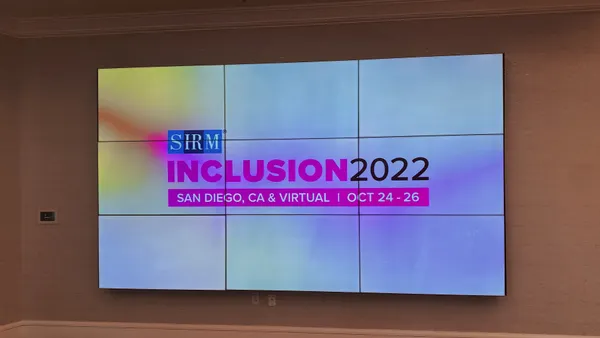Dive Brief:
- Four in 10 hiring managers who hold responsibility for "some or most of the hiring at their workplace" admitted to age bias in a Resume Builder survey of industry professionals conducted Feb. 1 and 2.
- Twenty-six percent of respondents said applicants' relevant work experience, "even if it spans 25+ years," should always be included on a resume.
- Thirty-eight percent of the 800 respondents — all supervisors, business administrators, or HR managers — said they "have caught themselves reviewing a resume with age bias," citing concern of candidates' inadequate tech skills and pending retirement.
Dive Insight:
While age discrimination against those 40 and older has been outlawed for decades in the U.S., it remains an "open secret" in many workplaces, sources previously told HR Dive. Today's tight labor market, however, could provide an extra push for HR pros to ensure hiring managers keep their biases in check.
Analyzing Resume Builder's findings, career consultant Stacie Haller, said in the report that candidate "experience over 20 years ago is …not applicable and not why the applicant would be considered for hire today." Instead, candidates should be able to express "how they individually do not fit the stereotype of their cohorts," she recommended.
For job seekers of a certain age with workplace experience spanning tens of years, such experiential erasure could create a certain added pressure to perform throughout an interview process and into employment — a psychologically troublesome prospect.
But "good news," said Haller in the report: Job seekers possess "collateral that removes the possibility of ageism bias." For more about this, HR Dive reached out to Haller who expounded in reply, recommending that job seekers withhold dates for employment histories and graduations predating 2000 and avoid references to outdated tech — eliminating, for example, an AOL email address. These, according to Haller, are "the candidate's collateral …some ways to remove ageism tendencies in the process." Notably, these recommendations on circumventing ageism in the hiring process are tasked to job seekers, rather than hiring managers.
A wider lens reveals an ongoing challenge for industry pros, no matter the age of talent. Hiring decisions require thought about a candidate's future, career strategist Bernadette Pawlik told HR Dive, and managers may consider factors like candidate geography and candidate mobility.
But HR pros need to know — and can help hiring managers understand — the difference between bias and legitimate factors. Certainly, bias exists in workforce management, and that's "part of a much bigger conversation that people in power don't want to have," she said.
That's where HR comes in. An older candidate living with her family in California, being looked at for a role in Chicago, could, at once, be right for the job but seen as a high-risk hire, for example. Potential is frequently on hiring managers minds, Pawlik said. "If I invest in this candidate, will [they] grow and thrive in this role and beyond? Younger people frequently try on and cycle through different professional identities, and that's understandable, but from the employer perspective, is [that younger] candidate the best investment?" HR can work to guide managers through consideration of legitimate criteria — such as geography — to ensure factors like age and gender stereotypes don't factor into decisionmaking.
Moreoever, ageism may give way to the realities of pandemic marketplace supply and demand. In a thread of similar discussion on LinkedIn, Pawlik wrote "I always pay attention to demographics, because that's the long lead on the talent pipeline, and as the [population] continues to skew towards those who are older … we won't be able to afford losing talent because of age!"












